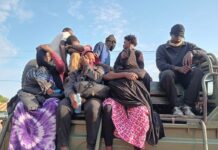As the Dalasi, Gambia’s currency, continues to depreciate against major international currencies, an inside source has informed TAT that Central Bank Governor Buah Saidy and top officials at the presidency have been “colluding” in the supply of foreign currency to the local exchange bureau’s.
The named Individuals and forex bureaus which the CBG reportedly deals with include JV Trading, George Banna, Shyben Madi, Gam Food Trading Company, Sud FM Shop, Cendual Enterprise, and Futanka Enterprise. Our sources say each of these entities received up to $3M at a time in hard currency.
Futanka Enterprise and Fouta Enterprises are owned by one Kalilu Waggeh, who imports essential commodities, including flour. Waggeh is the man President Adama Barrow said gifted him a four-wheel drive vehicle.
Meanwhile, one financial analyst told TAT: “At the rate the US$ is going, it’ll reach $1 to D70, and that’ll be a disaster for consumers; we need to regulate the forex bureaus.”
Records show the Dalasi was very stable from 2017 to the end of May 2022, with the exchange rate almost straight at D52 to the U.S. Dollar.
According to our findings, deals that rely on manipulation of operations in the forex market have been going on for years in the financial sector.
“They sell the foreign currency, net their profits, and then buy back to deposit in the relevant account. So the account concerned will reflect the correct amount deposited but won’t show the delay in depositing.
“They also hoard the foreign currency to create scarcity and then sell at a higher price. Then, once they’ve made their illegal profit – since that’s not credited to the government’s account – they move in to stabilize the rate to what it should be,” one source said.
When they later sell at an exorbitant price, the Dalasi depreciates against major world currencies. Another effect of this scheme is that the state is deprived of much-needed revenue, our source added.
A senior Central Bank official told TAT: “This shows the highest-level CBG staff involvement in speculation in the forex market. This is illegal and unprofessional and undermines the smooth operations of the volatile forex market.

“As a regulator of the financial market, if CBG is involved in this unacceptable practice, then it has no moral authority to provide oversight to the forex market.”
The CBG always has forex stashed in-house to facilitate payments such as to the Cuban doctors, soldiers’ return from Darfur, travel per diems of senior staff, and so on.
“When the level is low, CBG always goes into the market to buy from banks, which often deposit forex with the Bank for the CBG to pay the equivalent amount in banks’ Nostro accounts overseas.
“Commercial banks will then ship the cash to return funds to CBG overseas accounts mainly in U.S. Federal Reserve accounts.”
The impact of such a practice, experts say, hikes foreign exchange rates, as seen in the Dalasi depreciating quickly in recent weeks and months.
From our findings, the CBG usually invites banks to bid, either in the sale or purchase of forex, transparently in terms of the volumes and prices offered.
“A committee will sit over this to evaluate the bids and accept or reject them based on the price offered.
“However, this committee is now replaced by the Governor. He takes all the decisions without technical advice from experts in the Financial Markets and Economic Research departments,” an inside source told TAT.
Also, two CBG committees – the Foreign Exchange Intervention Committee and the Foreign Exchange Reserves Management Committee – are now rendered dormant as they do not meet to review the exchange rates, reserve levels, investments, forex stability, safety, liquidity, and returns.
This was the case until the Governor’s directive to suspend the shipment of U.S. dollar deposits in banks, which now could not get their dollars back and will be paid in Dalasis.
This resulted in dollar scarcity in banks, with business people preferring to keep their Dollars in their offices and homes.
In May 2022, the Central Bank wrote to the country’s commercial banks and financial institutions, directing them to suspend the payment of withdrawals in foreign currency and to limit transactions to the local currency, the Dalasi.
“Any bank found to have permitted the withdrawal of cash in a foreign currency will be duly penalized as prescribed by the Central Bank,” a letter sent to all banks and seen by TAT announced.
The CBG Governor signed the letter and declared that the Bank would “continue to monitor the situation and will not hesitate to institute measures against any institution found wanting in the foreign exchange business.”
Consequently, several sources told TAT some businesses and banks took their monies to banks in Senegal and Bissau, denying the country much-needed foreign currency.
The process also disrupted the Dalasi exchange rate, which depreciated from D52 to D58.50 and continues to inflate at D62 to the dollar.
When it became evident that the directive was unpopular, there was a reversal months later. However, this could not boost the supply of the U.S. dollar; as a result, the exchange rate increased, further depreciating the Dalasi, as the damage was already done, a CBG insider told TAT.
TAT sent several emails and communications to the Bank, which had not responded or comment when we opted to publish this story.






